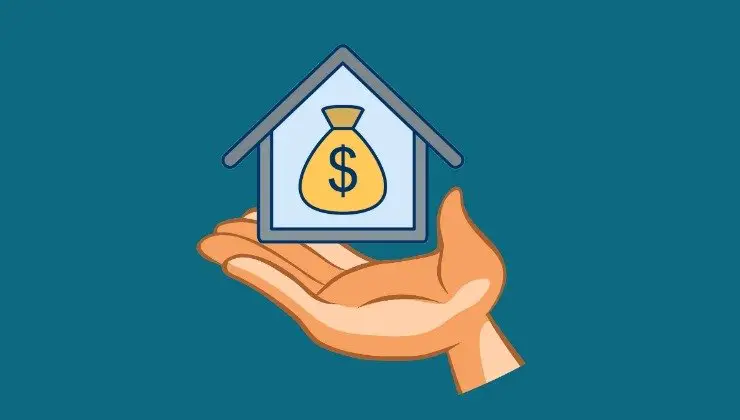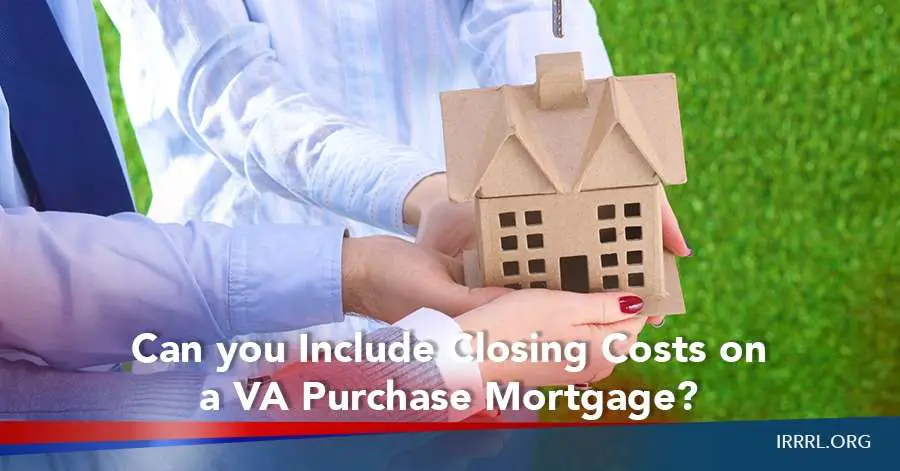Rolling Closing Costs When You Refinance
If youre refinancing an existing home loan, its often possible to include closing costs in the loan amount.
As long as rolling the costs into your mortgage doesnt impact your debttoincome or loantovalue ratios too much, you should be able to do it.
- As an example, lets say your new loan amount is $200,000, excluding closing costs
- If your home is valued at $250,000, your LTV is 80%.
- If your maximum approval is 80% LTV, or youre just wanting to stay at or below the 80% mark in order to avoid paying private mortgage insurance , you may not be able to roll the closing costs back into your loan
But if your loantovalue ratio is low enough, taking on a small extra loan amount might not make too much of a difference.
Find A Low Or Noclosingcost Loan
If youre refinancing, you should have options for rolling closing costs into your loan. Simply compare offers from a few different lenders and see which one suits your needs.
If youre buying a home, you likely wont be able to finance your closing costs.
But look into other options, like a seller concession or lenderpaid closing costs with a higher interest rate. These could help you if you cant make up the outofpocket finds.
Ready to get started?
Can Your Closing Costs Be Included In The Loan Balance
Youve probably heard the saying, Life isnt fair. Thats especially true when youre buying a home.
While the seller usually pays the real estate commission and a few other fees, the bulk of the costs of buying a home are the responsibility of the buyer and those fees can easily add up to thousands of dollars or more.
In this article, well discuss how investors can keep more cash on hand by including closing costs in the total loan amount.
Also Check: Stilt Interest Rates
Fha Closing Cost Assistance Programs
Many people are asking whether there are FHA closing cost assistance programs. A program like this is not common and if available, would be found locally. Most assistance programs are down payment assistance programs. In theory, you could find a down payment assistance program and then use the money that you do have to help offset some of your closing costs.
The most realistic way to have your FHA closing costs paid for is to negotiate that with the seller.
Ltv And Refinance Vs Purchase Mortgages

When you borrow a mortgage, the lender agrees to lend you a certain percentage of the propertys value, referred to as the loan-to-value ratio or LTV. For example, say you want to buy a property for $200,000, and the lender agrees to an LTV of 90%. They would then lend you $180,000 or 90% of the purchase price.
For purchase loans, you need to come up with cash for a down payment to cover the remaining balance, plus the closing costs. But in refinance loans, you might already have enough equity in the property to roll the closing costs into the mortgage.
Say you own a property worth $200,000, and you only owe $100,000 on it. The lender agrees to an LTV of 90%, or a loan of $180,000, of which $100,000 goes to paying off your existing loan, and the remaining $80,000 goes to your cash out and closing costs.
The higher the LTV, the greater the risk for the lender. Higher LTV loans tend to come with higher interest rates and higher closing costs. When your LTV ratio goes beyond that percentage, lenders may require you to purchase private mortgage insurance .
Recommended Reading: What Kind Of Loan For Land
A Historic Opportunity To Potentially Save Thousands On Your Mortgage
Chances are, interest rates won’t stay put at multi-decade lows for much longer. That’s why taking action today is crucial, whether you’re wanting to refinance and cut your mortgage payment or you’re ready to pull the trigger on a new home purchase.
The Ascent’s in-house mortgages expert recommends this company to find a low rate – and in fact he used them himself to refi . and see your rate. While it doesn’t influence our opinions of products, we do receive compensation from partners whose offers appear here. We’re on your side, always. See The Ascent’s full advertiser disclosure here.
What You Need To Know About Closing Costs
During closing, youll need to review and sign loan and other paperwork to finalize the home purchase process, as well as pay some upfront costs.
- Your closing costs, which will depend on your lender, type of mortgage, and home location, may cost thousands of dollars theyre typically 2 to 5% of your home purchase price.Estimate your costs.
- Closing costs can be paid by you, the home seller, or the lender.
- You may be able to use monetary gifts from family for all or a portion of your closing costs.
Donât Miss: How Big A Mortgage Can I Get With My Salary
Recommended Reading: Usaa Used Car Loan Rate
Recognize Other Eligible Closing Costs
Lender origination points, attorney fees, appraisal costs, home and pest inspection charges, credit reports, document preparation, recording and survey fees are closing costs that can be financed and rolled into the FHA loan amount. Lender origination fees typically are the most expensive item, as one point equals one percent of the loan amount. One point will cost a $1,000 for each $100,000 of the loan amount.
No Down Payment No Closing Cost Home Loans
A qualified veteran typically can get 100% financing to purchase a home. A no closing cost VA home loan enables the home buyer to receive lender credit to cover all closing costs and pre-paids and get into their home with no money out of pocket. The VA finding fee is added to the loan amount or waived if the veteran has more than 10% disability to be exempt for the VA funding fee.
You May Like: Auto Refinance Calculator Usaa
Introduction To Private Mortgage Insurance
For homeowner mortgages such as Fannie Mae and Freddie Mac loans, youll have to pay extra each month for PMI if you borrow more than 80% LTV.
The higher the loan-to-value ratio, the greater the risk profile of the mortgage for the lender. This kind of insurance protects the lender against your default it doesnt protect you.
The private mortgage insurance fastens the process for some individuals to become homeowners. If you commit to meet between 5% to 19.99% of the propertys cost, PMI gives you a guarantee of accessing financing. The policy has additional monthly charges. You must pay your PMI until you have accrued satisfying equity in the home that the lender no longer sees them as high-risk.
The costs of PMI insurance range between 0.25% to 2% of your loan balance per year. The costs depend on your credit score, loan terms, the number of deposits and mortgage. The more your risk factors, the more the rate you will pay. You can request that monthly PMI policy payments be cancelled once the LTV ratio gets below 80%. The lender is supposed to eliminate PMI when LVT ratio drops to 78%. This is possible if your interests and deposit equal to 22% of the propertys buying price.
Closing Costs: What You Can Control
Closing costs are a necessary part of your home purchase. Transferring a property and obtaining a loan are complicated processes, and they require help from numerous different sources. Unfortunately, the people doing that work wont do it for free.
Still, its wise to educate yourself on closing costs and learn how to keep charges to a minimum.
Read Also: How To Calculate Va Loan Amount
What Can Buyers Expect To Pay
Who pays closing costs and Realtor fees? Homebuyers pay the majority of these costs, since many of these fees are associated with the mortgage.
If youre paying cash for a property, there are still a few closing costs, but they are significantly less, says Cara Ameer, a Realtor® in Ponte Vedra, FL.
Here are some of the fees homebuyers should brace themselves to pay:
Buyers should also account for the following:
- An escrow deposit, managed by a neutral third-party escrow officer, covering typically two months of prepaid property taxes and mortgage insurance payments
Which Closing Costs Cannot Be Rolled Into An Fha Loan

There are some closing costs which cannot be rolled into the loan. These costs include all of the prepaid fees at closing such as your prepaid interest, prepaid taxes, homeowners insurance premium, interest owed at closing, and your escrows for taxes and insurance.
Your lender can provide you with a good faith estimate which should outline all of these costs for you. It is important to note that the lender does not generate these costs, but instead they are the messenger. You will negotiate your homeowners insurance with your agent, your taxes are determined by your township and the prepaid interest will depend upon which day of the month you close.
You can see that the majority of the FHA closing costs can be financed. Especially those big ticket items such as the mortgage insurance premiums
Read Also: Usaa Car Loan Pre Approval
Options For Home Buyers
If you are purchasing a home, you likely wont be able to roll the closing costs into your mortgage. This option is typically only open to those refinancing an existing home loan.
When buying a home, borrowers usually have four ways to cover the closing costs:
There are exceptions for certain fees.
For instance, if youre using an FHA loan, the 1.75% upfront mortgage insurance premium is typically rolled into the loan amount. The same goes for VA loan funding fees.
You could also pay closing costs with gift money from a relative or friend, or a grant from a public agency if youre unable to pay them out of pocket.
When It Makes Sense To Finance Closing Costs
Financing your closing costs doesnt mean that you avoid paying them entirely. It simply means that you dont have to bring thousands of dollars to the closing table. If youve already spent a large portion of your savings on your down payment, financing your closing costs over the term of your mortgage might be a good idea.
It might also be worth considering if youre refinancing your home or youre applying for a home equity loan. You might not end up paying too much extra interest, especially if you pay off your loans relatively quickly.
Recommended Reading: Www Upstart Com Myoffer
Check For Random Fees
The loan estimate you get from your lender will breakdown every fee theyre charging. Courier fees, a fee to pull your credit report, fees for mailing documents, etc. These are random fees some lenders charge to try to get the most out of a borrower.
If you notice any of these charges, tell your loan officer youre not paying those fees. In all likelihood, they will waive the fees to keep you as a customer.
Should You Roll Them Over
There might be times, especially when your down payment is the barest minimum, that attempting to include closing costs in the actual mortgage could put you outside of the approval window. When this happens, the ratio of debt to the home’s market value is too low. In a tight economic climate, lenders closely watch this ratio to be sure that you can actually handle the mortgage.
But if you have an adequate cushion between your mortgage amount and your home’s appraised value, wrapping closing costs into your mortgage can give you breathing room to recarpet the house or put in the much-needed driveway. Just remember that if you do roll closing costs into your mortgage, you’ll want to plan to stay in the house a while as it takes a few years to recover the cost.
Read Also: Nerdwallet Loans
The Downsides Of Rolling Closing Costs Into Your Mortgage Refinance Loan
When you roll your closing costs into your mortgage refinance loan, you’ll have to pay interest on that money the entire time you’re paying off your home loan. This can actually make these fees more expensive.
Consider the difference between that $200,000 loan and the $206,000 loan mentioned above. If you took out a 30-year $200,000 loan at 3.25%, your monthly payment would be $870 and your total interest costs would be $113,428 over the life of the loan. But if you borrowed $206,000 because you tacked on closing costs, monthly payments would be $897 and you’d pay $116,831 in total interest over the life of the loan. Instead of paying $6,000 up front, you’d pay an extra $27 per month every month for three decades. That means you’d end up spending about $9,700 on closing costs and the interest paid on them.
Increasing the amount you borrow and your monthly payment could also make loan approval more difficult. That could be an especially big issue if you’re close to exceeding your lender’s allowable debt-to-income ratio or if you’re refinancing a loan with a balance close to 80% of your home’s current value.
What Is A Wrap Around Mortgage
In a wrap around mortgage, the seller doesnt pay off their loan. Instead, they leave it open, and issue a new loan to the buyer that wraps around the original loan.
On the buyers side, the loan looks like any other type of seller financing. The seller provides them a loan, typically at a higher interest rate than conventional mortgages, and the buyer has a certain number of years to refinance or otherwise pay off the loan in full.
The difference from a traditional seller-financed mortgage lies on the sellers side. Rather than pay off their existing mortgage and lend the entire new loan amount to the buyer, they leave their original mortgage open, and only lend the buyer the difference between the two.
And in so doing, they typically earn an interest spread, charging higher interest to the buyer than what they themselves pay to their lender. The new loan gets recorded on title in second lien position, after the original mortgage.
However, the new loan is not a second mortgage. The borrower pays interest on the full loan amount, not just the difference between the old mortgage balance and the new one.
Sound complicated? Its not as complex as it sounds, and best illustrated with an example.
Read Also: Usaa Auto Refinance Reviews
Why You Shouldn’t Roll Closing Costs Into Your Mortgage
by Christy Bieber | Updated July 19, 2021 – First published on April 13, 2021
There’s a host of downsides to rolling closing costs into your mortgage.
When you get a new mortgage or a refinance loan, you’ll usually need to pay closing costs. These are usually around 2% to 5% of your home’s value, and they can add up to several thousand dollars.
Typically, when you’re getting a new mortgage, you have to pay these costs out of pocket up front. However, when you refinance a mortgage, some lenders let you roll these costs into your new loan. That means if you were going to borrow $200,000 and pay $6,000 in closing costs, you’d instead borrow $206,000 and pay no closing costs up front.
This may sound like an attractive option since you don’t need to come up with several thousand dollars to close on a refinance loan. But, in many cases, it’s actually a far better idea to pay the closing costs up front and be done with them rather than dragging out repayment over time. Here’s why.
The Bottom Line: Is A No

The truth is, no-closing-cost mortgages can make a ton of sense for some people and zero sense for others. As a general rule, youre probably going to pay less over the entire life of a loan if you pay closing costs upfront.
That said, coming up with the necessary funds to do this isnt always easy, so spreading out the cost of closing over the whole loan term might be the right choice for some. You should do as much research as you can, and dont stop asking questions to hold your lender accountable in terms of transparency and their laying out every possible option for you.
Dont know where to start? Check out more mortgage basics articles in the Rocket Mortgage Learning Center. If you think youre ready to get started, you can apply online or give us a call at 326-6018.
Take the first step toward the right mortgage.
Apply online for expert recommendations with real interest rates and payments.
Don’t Miss: How Do Lenders Verify Bank Statements
Is Rolling Closing Costs Into Your Loan The Same Thing As A No
Rolling closing costs into your mortgage is usually not the same thing as a noclosingcost mortgage.
Generally, when lenders advertise no closing cost or zero closing cost mortgages they are referring to the process of trading a slightly higher interest rate in return for a lender credit.
A lender credit means the mortgage company will cover part or all of your closing costs.
With these mortgages, the lender will front many of the initial closing costs and fees, while charging a slightly higher interest rate over the duration of the loan.
The downside is youll pay a larger monthly payment over the long haul. And, youre likely to pay significantly more in interest overall.
However, the idea is that you dont have to come up with as much cash up front. This can be helpful when you are also having to come up with a large down payment.
